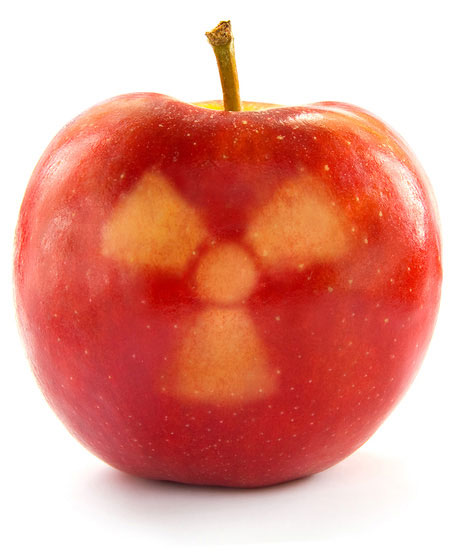Over the past several years the organic food market has exploded, but is buying organic really worth the extra price?
First it’s important to understand what the term organic actually means. Organic as defined by the USDA stands for Food grown or raised without the use of additives, coloring, synthetic chemicals (e.g., fertilizers, pesticides,hormones), radiation, or genetic manipulation and meets the criteria of the U.S.D.A. Standard National Organic Program.
So simply put organic foods are not processed using irradiation, sprayed with dangerous pesticides, injected with hormones and antibiotics, grown in chemical fertilizers, genetically modified or contain chemical food additives. Confused? I was too…
Irradiation is a questionable method used in the preservation of today’s conventional foods. Essentially this process involves shooting X-rays or high energy electron beams from machines to increase a foods shelf life. This does kill some harmful bacteria, however, when food is irradiated, many nutrients are such as vitamins, minerals, enzymes and antioxidants are also destroyed. Irradiation also created untested compounds, referred to as unique radiolytic products or URPs. Scientists have not studied the long-term effects of these new compounds in our diet.
Pesticides are poisons designed to kill living organisms and are harmful to humans. Many pesticides that are still being used today were approved long before research linked these chemicals to diseases such as cancer. Today, there are hundreds of pesticides approved for use in the United States that present different health risks. A scary reality is that every year more than two billion pounds of pesticides are added to our food supply. That’s about 10 pounds per person per year! This is a major reason to do a detox at least once or twice per year. If you’re not eating organic food at the very least make sure you really wash your produce with a veggie wash.
Consuming farmed animals injected with hormones and antibiotics exposes our bodies to those same hormones and antibiotics because we actually eat, what we eat, eats too. Scientists now have clearly shown that these hormones can increase the risk of disrupted development and cancer in humans. Also the use of antibiotics in our farming practices has encouraged the evolution of new strains of antibiotic-resistant bacteria in our food supply. This is not only detrimental to our health but also to the health of the environment.
A genetically modified organism or GMO is a plant or animal that has been genetically altered by scientists to express different characteristic traits. There is a growing body of evidence that now connects GMOs with health problems and environmental damage. Not to mention, GMOs have only been in our diet since the mid 90’s and long term studies haven’t been done on their impact to the human body. Most developed nations do not consider GMOs to be safe. In fact, in more than 60 countries around the world, including Australia, Japan and all 28 countries in the European Union, there are significant restrictions and bans on the production and sale of GMOs. This is because GMOs are not only harmful to eat they also pollute our air, water and soil.
Here are the Top 10 reasons to buy and eat organic foods:
1. Keep chemicals off your plate. Pesticides are poisons designed to kill living organisms and thus are harmful to humans. Many approved pesticides were registered long before extensive research linked these chemicals to cancer and other diseases. Organic agriculture is a way to prevent any more of these chemicals from getting into the air, water and food supply.
2. Protect future generations. Children are four times more sensitive to exposure to cancer-causing pesticides in foods than adults. This is because they are smaller and therefore the dose is much stronger.
3. Protect water quality. Pesticides pollute the public’s primary source of drinking water for more than half the country’s population.
4. Organic farmers work in harmony with nature. Three billion tons of topsoil erodes from croplands in the U.S. each year, and much of it is due to conventional farming practices, which often ignore the health of the soil. Organic agriculture respects the balance necessary for a healthy ecosystem. Wildlife is encouraged by including forage crops in rotation and by retaining fencerows, wetlands and other natural areas.
5. Save energy. More energy is now used to produce synthetic fertilizers than to till, cultivate and harvest all the crops in the U.S.
6. Help small farmers. Although more and more large-scale farms are making the conversion to organic practices, most organic farms are small, independently owned and operated family farms. USDA reported that in 1997, half of U.S. farm production came from only 2% of farms. Organic agriculture can be a lifeline for small farms because it offers an alternative market where sellers can demand fair prices for crops. 5
7.Support a true economy. Organic foods might seem expensive at first. However, your tax dollars pay for hazardous waste clean-up and environmental damage caused by conventional farming. 6
8. Promote biodiversity. Planting large plots of land with the same crop year after year tripled farm production between 1950 and 1970, but the lack of natural diversity of plant life has negatively affected soil quality. 7
9. Nourishment. Organic farming starts with the nourishment of the soil, in turn producing nourishing plants. Well-maintained soil produces strong, healthy plants that have more nutrients than conventionally grown produce. 5
10. Flavor. Last but not definitely not least, organic food contains more nutrients than conventional food and simply taste better than conventional food.
So is organic food worth the extra price? The answer is absolutely. Now I know it may not be realistic to always eat all organic, all the time. But by trying to eat as much organic food as you can you’re not only insuring your health but the health of the planet. The truth is it’s the small things you do and don’t do that effect how you look and feel now and in the future.

